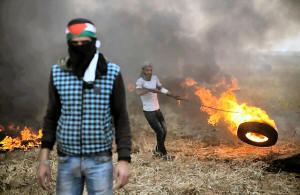|
Israeli fire kills Palestinian at Gaza
border, with more frontier protests ahead
 Send a link to a friend
Send a link to a friend
 [April 05, 2018]
By Nidal al-Mughrabi [April 05, 2018]
By Nidal al-Mughrabi
GAZA (Reuters) - Israeli fire killed a
Palestinian at the Gaza border on Thursday and another died of wounds
suffered several days ago, health officials said, bringing the number of
Palestinian dead in a week of frontier protests and violence to 19.
The Israeli military said one of its aircraft targeted an armed militant
near the security fence along the Gaza Strip.
Tens of thousands of Palestinians began a six-week-long protest last
Friday in tent encampments along the fenced border of the
Israeli-blockaded Gaza Strip, an enclave of two million ruled by the
militant Hamas Islamist group.
The demonstrators are pressing for a right of return for refugees and
their descendants to what is now Israel.
The latest deaths are likely to add to international concerns over the
violence, which human rights groups have said involved live fire against
unarmed demonstrators posing no immediate threat to life. Israel says it
is doing what is necessary to defend its border and prevent it from
being breached.
Sixteen Palestinians died after being shot by Israeli troops on the
first day of the protest, Palestinian medical officials said, and
another was killed on Tuesday.

A 33-year-old man, hit by Israeli fire a few days ago near one of the
tent cities, died on Thursday, the health officials said.
The military said that during the protests its troops had used live fire
only against people trying to sabotage the border fence or rolling
burning tyres and throwing rocks.
Some of the dead were identified by Palestinian militant groups as
members.
LETHAL FORCE
U.N. Secretary-General Antonio Guterres has called for an independent
investigation into Friday's deaths and appealed to those involved to
refrain from any act that could lead to further casualties or place
civilians in harm's way.
U.N. deputy political affairs chief Taye-Brook Zerihoun, commenting on
the violence, has said lethal force should only be used as a last
resort.
Israel's defence minister, Avigdor Lieberman, described most of those
killed as "terrorists ...active in the armed wing of Hamas and Islamic
Jihad". The two groups advocate the destruction of Israel, which along
with the West, regards them as terrorist organizations.
Many of the demonstrators who turned out for the start of the protest
campaign returned to their homes and jobs over the week. But organizers
expect large crowds again on Friday, the Muslim sabbath.
Hamas announced on Thursday it would pay $3,000 to the family of anyone
killed in the protests, $500 to Palestinians critically wounded and $200
to those who sustain more minor injuries.
[to top of second column]
|

A Palestinian protester moves a burning tire during clashes with
Israeli troops at Israel-Gaza border, in the southern Gaza Strip
April 5, 2018. REUTERS/Ibraheem Abu Mustafa

Israeli leaders have said payments by Palestinian authorities to the
families of militants killed or imprisoned by Israel encourages
attacks on Israelis. Palestinians revere brethren killed in the
conflict with Israel as martyrs.
Visiting the frontier this week, Lieberman warned protesters
"against continuing the provocation and said that "every person who
comes close to the fence is endangering their lives".
Protesters have been stocking up on tyres and say they intend to
burn thousands of them at the border and also use mirrors and lasers
to distract Israeli sharpshooters across the frontier on Friday.
Speaking on Army Radio, Israeli Public Security Minister Gilad Erdan
said: "We are prepared for every scenario, even an attempt to cause
sharpshooters to lose focus."
The protest action is set to wind up on May 15, when Palestinians
mark the "Naqba", or "Catastrophe", when hundreds of thousands fled
or were driven out of their homes during violence that culminated in
war in May 1948 between the newly created state of Israel and its
Arab neighbors.
Israel has long ruled out any right of return, fearing it would lose
its Jewish majority.
Israel-Palestinian peace talks have been frozen since 2014.
The Palestinians are furious at U.S. President Donald Trumpís Dec. 6
decision to recognize Jerusalem as Israel's capital, and to move the
U.S. Embassy to the city. Its eastern half was taken by Israel in a
1967 war and is wanted by Palestinians for the capital of a future
state.

(Writing by Jeffrey Heller, Editing by William Maclean)
[© 2018 Thomson Reuters. All rights
reserved.]
Copyright 2018 Reuters. All rights reserved. This material may not be published,
broadcast, rewritten or redistributed.
Thompson Reuters is solely responsible for this content. |